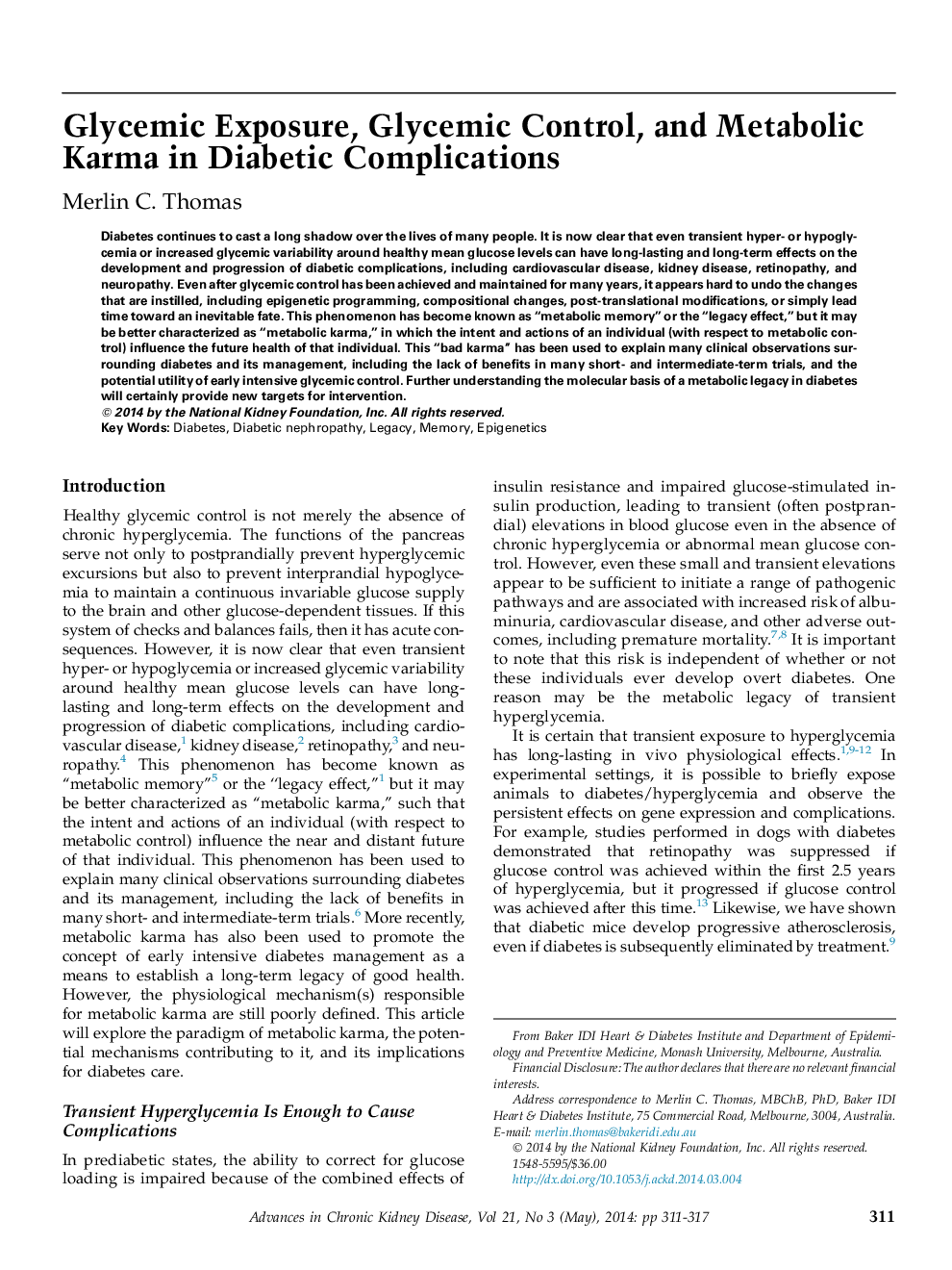| کد مقاله | کد نشریه | سال انتشار | مقاله انگلیسی | نسخه تمام متن |
|---|---|---|---|---|
| 3846515 | 1248327 | 2014 | 7 صفحه PDF | دانلود رایگان |
عنوان انگلیسی مقاله ISI
Glycemic Exposure, Glycemic Control, and Metabolic Karma in Diabetic Complications
ترجمه فارسی عنوان
قرار گرفتن در معرض گلیسمی، کنترل گلیسمی و کارمای متابولیک در عوارض دیابت
دانلود مقاله + سفارش ترجمه
دانلود مقاله ISI انگلیسی
رایگان برای ایرانیان
کلمات کلیدی
ترجمه چکیده
دیابت همچنان یک سایه طولانی را بر زندگی بسیاری از مردم بازی می کند. در حال حاضر روشن است که حتی تغییرات بیش از حد یا هیپوگلیسمی گذرا و یا افزایش تغییرات گلیسمی در اطراف مقادیر متوسط قند خون می تواند اثرات طولانی مدت و بلند مدت بر توسعه و پیشرفت عوارض دیابت، از جمله بیماری های قلبی عروقی، بیماری کلیوی، رتینوپاتی و نوروپاتی . حتی پس از کنترل گلیسمیک برای سال ها به دست آمده و حفظ شده است، تغییرات ایجاد شده، از جمله برنامه نویسی اپی ژنتیکی، تغییرات ترکیب، تغییرات پس از ترجمه، و یا صرفا زمان سربازی به سوی سرنوشت اجتناب ناپذیر، بسیار دشوار است. این پدیده به عنوان حافظه متابولیکی شناخته شده است؟ یا یک اثر میراث، یک ؟؟ اما ممکن است بهتر به عنوان یک کارما متابولیک شناخته شود، یک؟ که در آن هدف و اقدامات فرد (با توجه به کنترل متابولیک) بر سلامت آینده این فرد تاثیر می گذارد. این کارما ؟؟؟ برای توضیح بسیاری از مشاهدات بالینی در مورد دیابت و مدیریت آن، از جمله فقدان مزایای در بسیاری از مطالعات کوتاه مدت و میان مدت و همچنین استفاده بالقوه از کنترل اولیه گلیسمی شدید استفاده شده است. بیشتر درک مبانی مولکولی یک میراث متابولیک در دیابت مطمئنا اهداف جدیدی برای مداخله فراهم می کند.
موضوعات مرتبط
علوم پزشکی و سلامت
پزشکی و دندانپزشکی
بیماریهای کلیوی
چکیده انگلیسی
Diabetes continues to cast a long shadow over the lives of many people. It is now clear that even transient hyper- or hypoglycemia or increased glycemic variability around healthy mean glucose levels can have long-lasting and long-term effects on the development and progression of diabetic complications, including cardiovascular disease, kidney disease, retinopathy, and neuropathy. Even after glycemic control has been achieved and maintained for many years, it appears hard to undo the changes that are instilled, including epigenetic programming, compositional changes, post-translational modifications, or simply lead time toward an inevitable fate. This phenomenon has become known as “metabolic memory” or the “legacy effect,” but it may be better characterized as “metabolic karma,” in which the intent and actions of an individual (with respect to metabolic control) influence the future health of that individual. This “bad karma” has been used to explain many clinical observations surrounding diabetes and its management, including the lack of benefits in many short- and intermediate-term trials, and the potential utility of early intensive glycemic control. Further understanding the molecular basis of a metabolic legacy in diabetes will certainly provide new targets for intervention.
ناشر
Database: Elsevier - ScienceDirect (ساینس دایرکت)
Journal: Advances in Chronic Kidney Disease - Volume 21, Issue 3, May 2014, Pages 311-317
Journal: Advances in Chronic Kidney Disease - Volume 21, Issue 3, May 2014, Pages 311-317
نویسندگان
Merlin C. Thomas,
